
The impact of climate change
We are finding, coaching and training public media’s next generation. This #NPRNextGenRadio project is created with the University of Nevada, Reno, where five talented reporters are participating in a week-long state-of-the-art training program.
In this project we are highlighting the experiences of people whose lives are being affected by climate change.
Nancy Vazquez speaks with Claire Holden, a student at UNR and assistant manager at the Desert Farming Institute. They help the community by providing fresh produce from their own garden. Despite having no formal gardening training, Holden uses methods learned from their jobs to make their garden sustainable despite desert climate and rising temperatures.
Illustration by Eejoon Choi
Rising heat in the dry desert: How a farmer and gardener makes the best of climate change
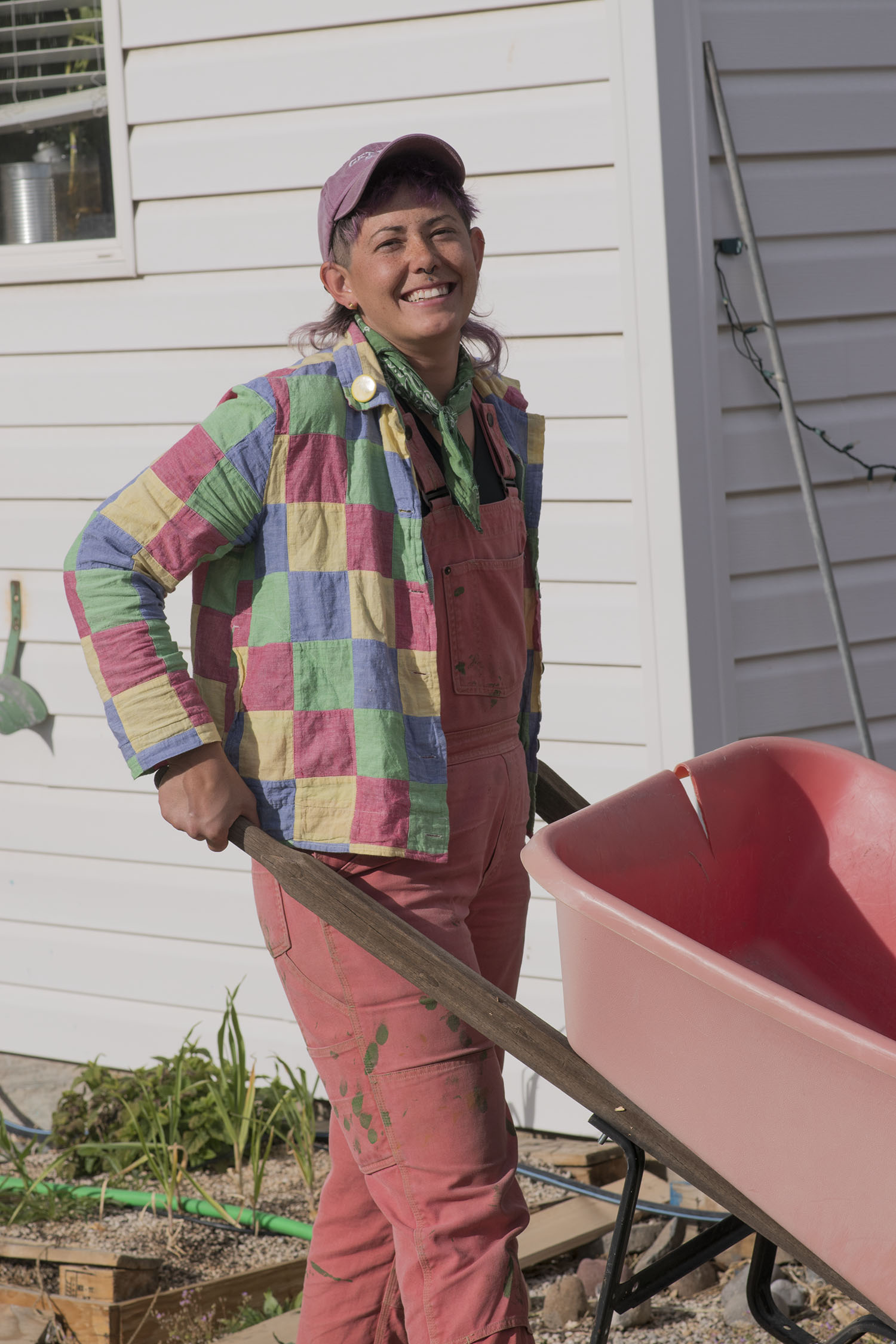
Claire Holden pauses for a photo while transporting soil from the garden in their wheelbarrow. (Photo by Nancy Vazquez)
Rising Heat In The Dry Desert
When Claire Holden arrived in Reno from Las Vegas a few years ago, they were new to gardening and farming. Now, Holden is the assistant farming manager for the Desert Farming Initiative (DFI) at the University of Nevada, Reno, (UNR) and they are a proud owner of their personal garden at home.
Holden applies lessons learned at their jobs to their personal life by incorporating sustainable and natural methods to their garden. This includes not using pesticides, which can kill off healthy bugs, such as beetles and butterflies that help propagate the plants. Instead, they combine vinegar with other ingredients and use neem oil, a naturally occurring pesticide, and shell powder to deal with pests.
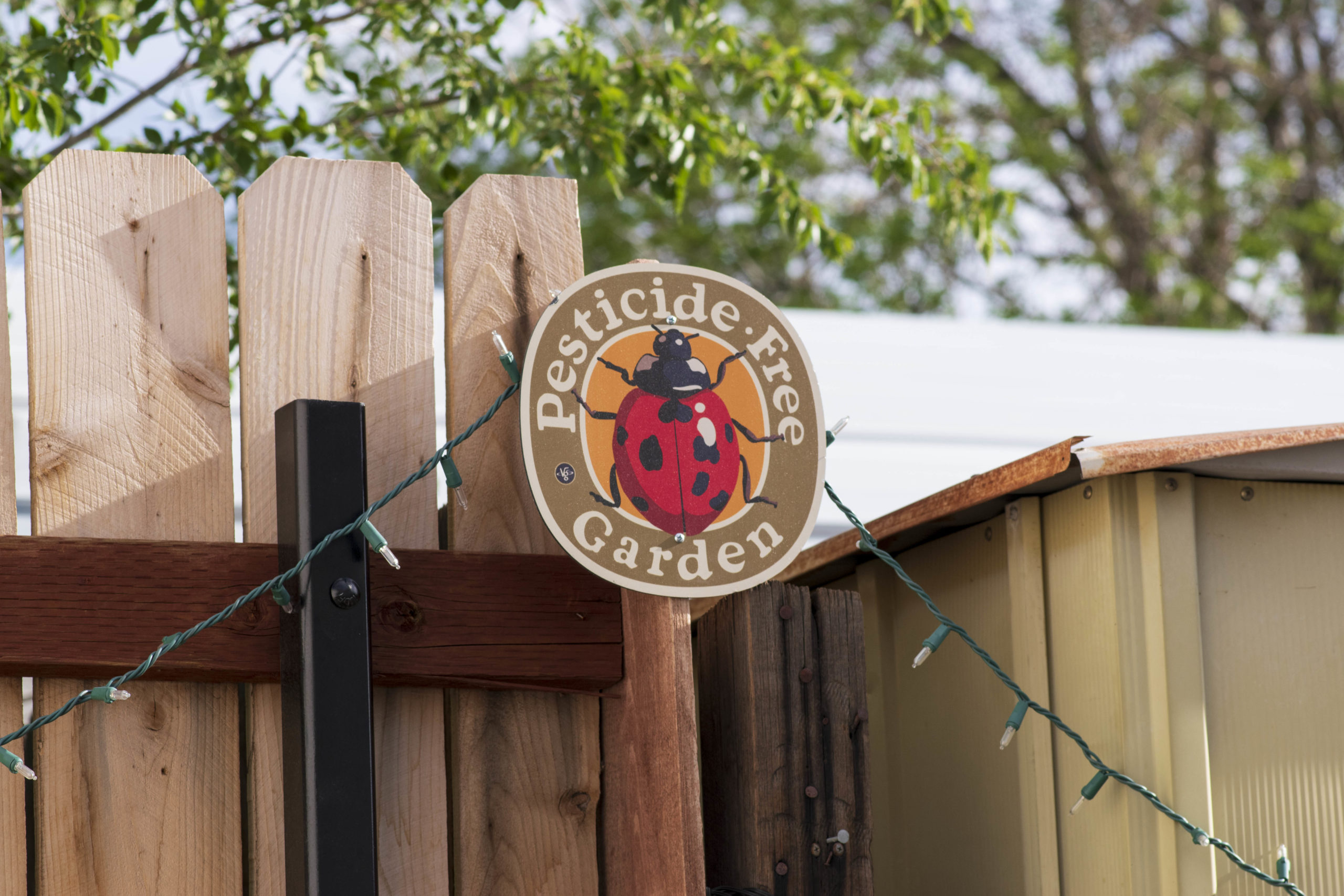
Holden has many small signs around their property advocating a healthy garden and promoting where they are employed. (Photo by Nancy Vazquez)
Holden’s garden stands out due to their love of repurposing. They’ve repurposed tires, pallets, coolers as well as other objects that would otherwise end up in a dump to use as planters.
Holden also makes sure to be aware of their water usage and with research from the DFI they discover new ways to combat the issue.
“Last year was our first year doing a three year melon trial of best practices on how to grow different varieties of melons in the desert, which ones work better, which ones are more drought tolerant. And all of the research that we do is published to the public. Any farmers in this area, or even maybe similar climates can use it as resources,” Holden said.
When Holden’s produce is ready to be eaten they love to share with their roommates and the community. They have a few mini fridges around the street where they put free fresh food for people to take. They believe it is important that everyone should have access to food, more importantly that the food is healthy and fresh.
“I don’t know if anyone has ever had the opportunity to stand in line at the food bank, or go to a group feeding that is put on by different groups in the city. It’s not always the most high quality food, which is better than nothing, I think. We could make a step in an even better direction of something that would not only fill people’s stomachs but make them feel really good,” Holden said.
Gardening and farming does come with its challenges, especially in a dry desert climate and in Reno where the sun could be shining one day and a snow storm could hit tomorrow.
“It’s like, very, very much predictably unpredictable,” they said.
Holden has learned to be perceptive about the constantly changing weather and has taken chances a couple of times putting out sensitive seedlings early in the season on occasions.
The heat can also be dangerous not only to plants but people.
“It’s [the heat] going to make fire season a lot worse, which makes it hard for people who work outside, you know, because it’s like, we have to find that happy medium of working outside when it’s like 400 AQI [air quality index] and it’s not safe to breathe,” Holden explained.
Anything over 100 AQI is considered unhealthy to breathe. An AQI of 400 can cause respiratory illnesses if someone is exposed for too long. During such situations people are advised to avoid all outdoor activity.
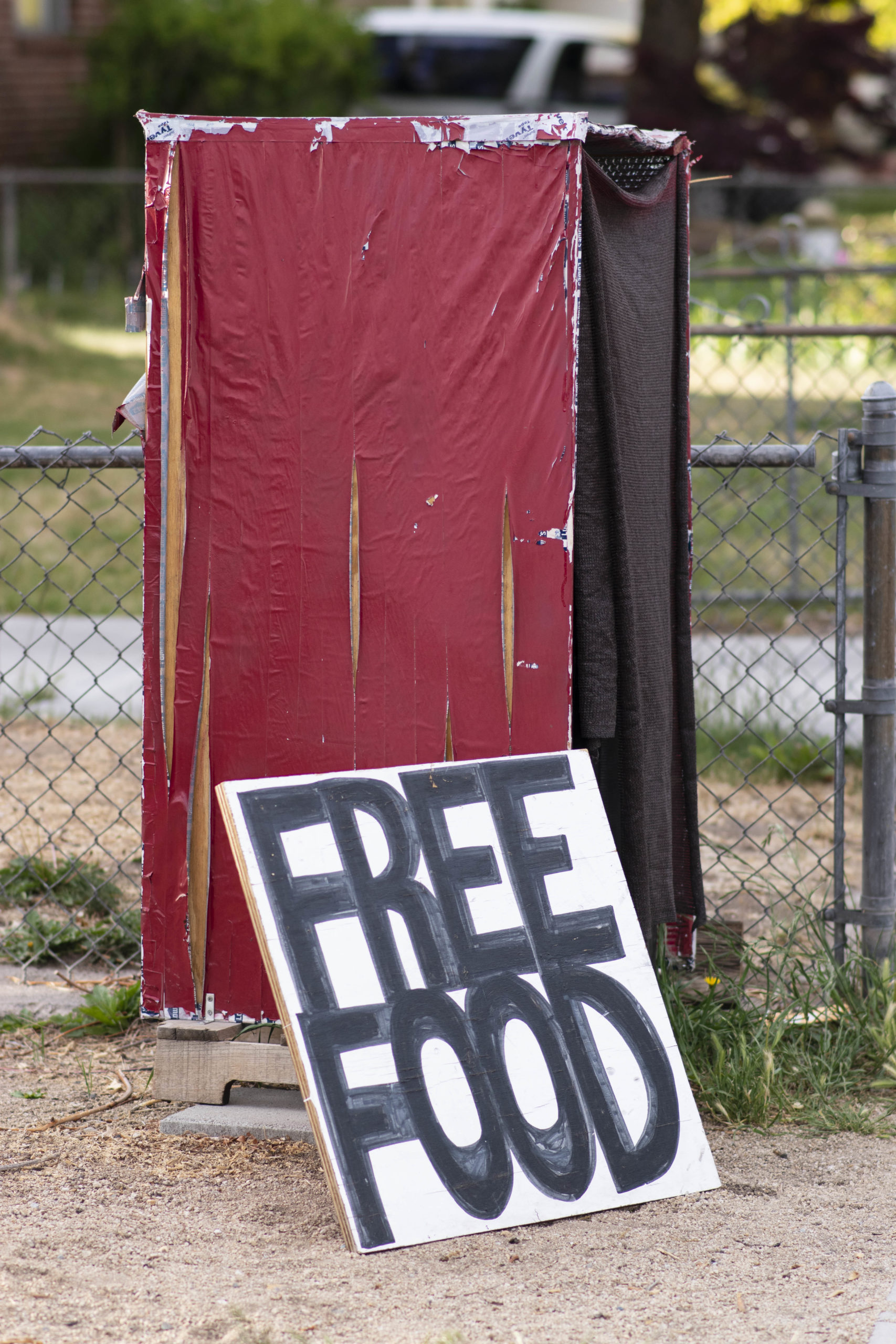
Enclosed in red and black tarps is a mini fridge for the community that Holden stocks with fresh produce. This helps to prevent food waste and help community members eat healthier. (Photo by Nancy Vazquez)
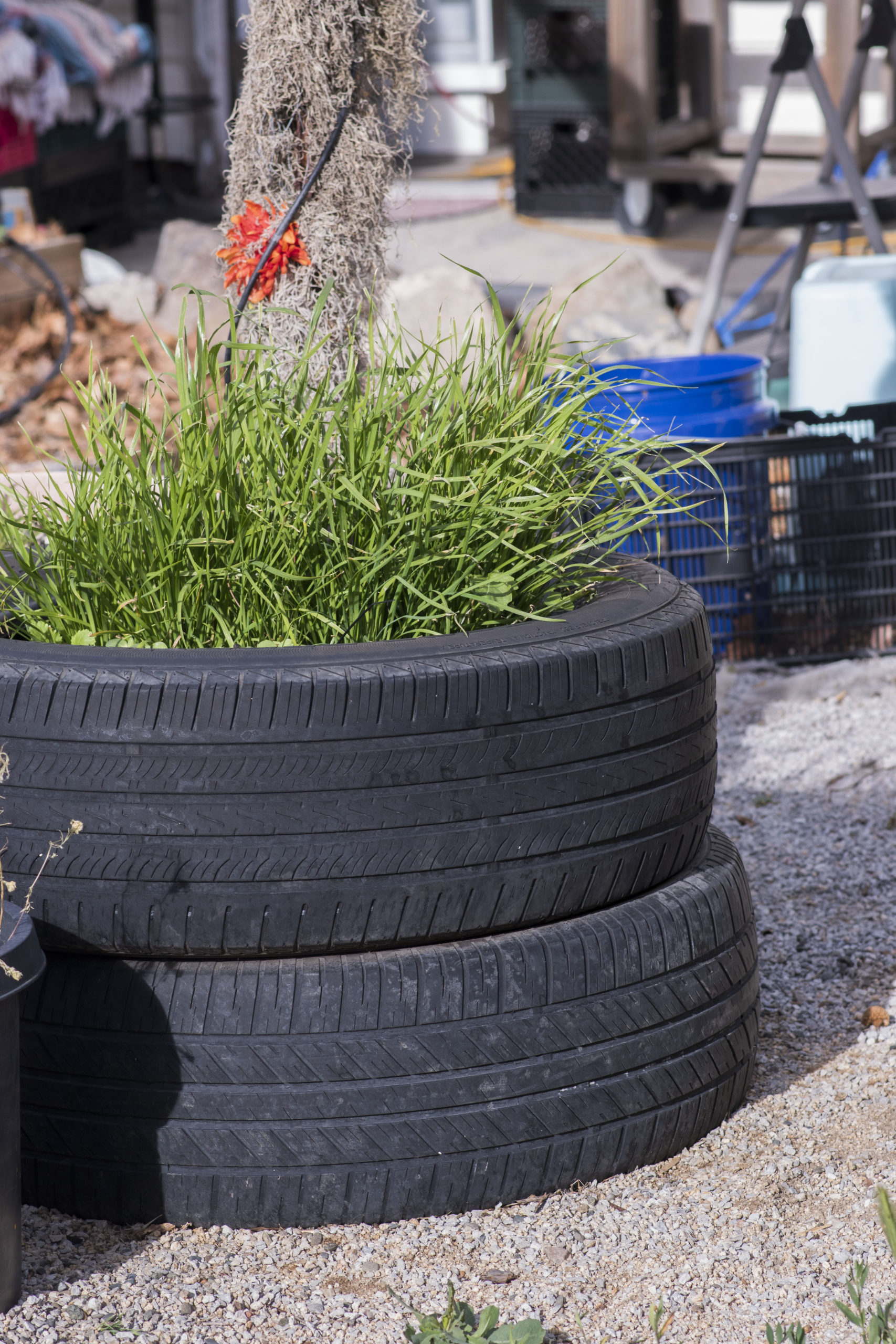
Holden uses a pair of tires that they found in the street as a planter. This is one of the many materials they upcycled for use in the garden. (Photo by Nancy Vazquez)
Another danger is heatstroke which can happen when working out in the sun for extended time such as Holden does. It is extremely important to stay hydrated throughout the day.
Due to this Holden has rethought their career multiple times. Their classes at UNR are not helpful and have left them feeling hopeless for the future. A problem that started decades ago has not seen much progress Holden describes.
“An office job sounds very nice sometimes when you’re sitting outside, and either it’s snowing and you’re freezing and you have six more hours to go or it’s the middle of summer, and you’ve drank three gallons of water and you’re still thirsty and stuff like that,”
Regardless Holden hopes to persevere. They hope to expand and improve their garden within the next couple months, completely transforming their backyard space. They also hope to learn more methods to apply to their own garden. Holden’s main focus in life are their goals of food sovereignty and smart farming and they hope little by little everyone joins them in that effort.
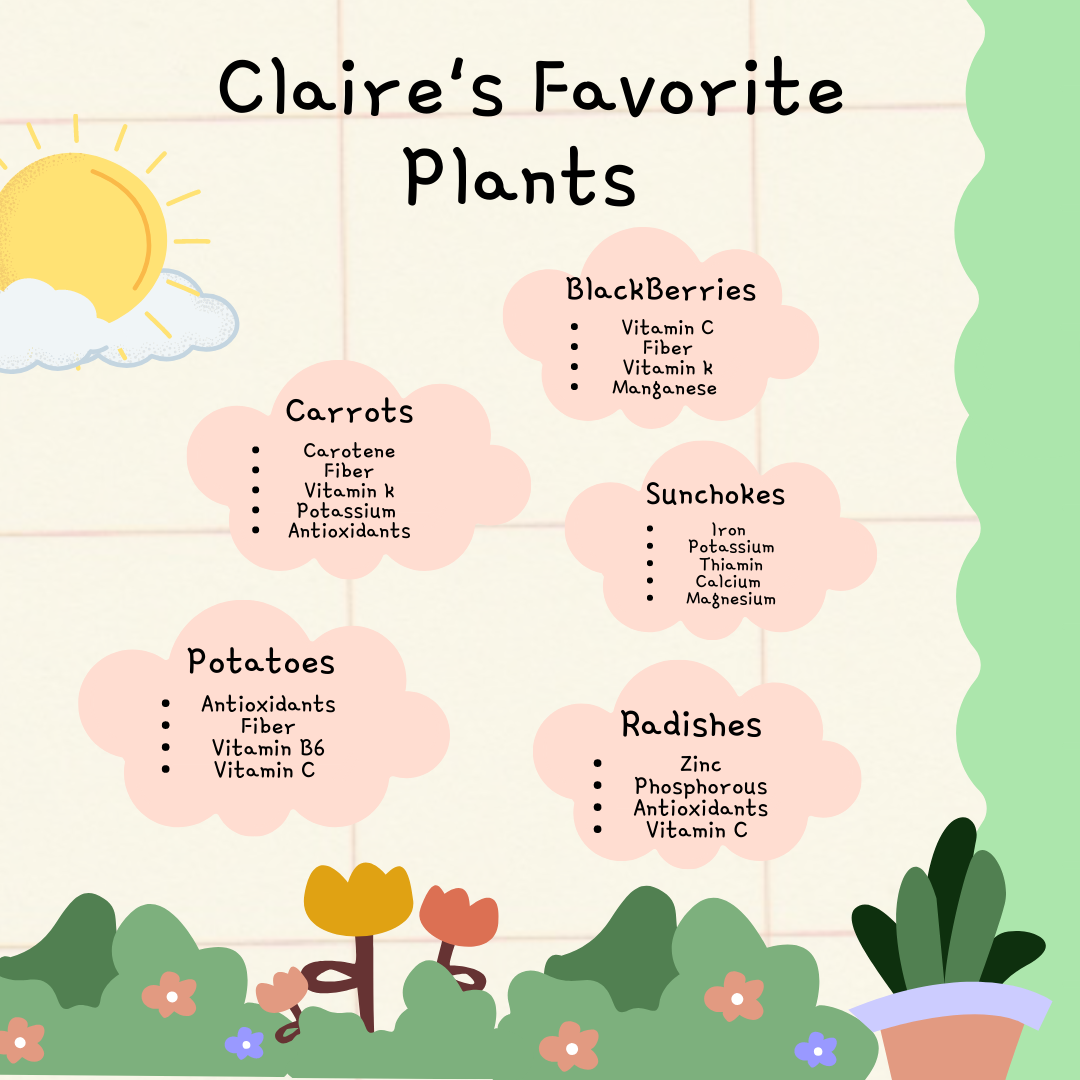
@v_4vazquez Claire Holden shares a funny story about working at the 🏜 Desert Farming Initiative for the University of Nevada, Reno. Make sure to check out the full story coming soon! 📰 #nprnextgenradio #gardening #climatechange
♬ original sound - Nancy Vazquez
Transcript
CLAIRE HOLDEN: I think it’s really important to grow your own food, not only just because of the mental health reasons and physical health, but like it really helps your own body, and like you to be more connected in the space that you are.
My name is Claire Holden. I use they/them pronouns. I am currently a senior at UNR and studying environmental science with a minor in geo technology. I work as the assistant farm manager at the Desert Farming Initiative which is UNR’s campus organic farm, and yes, I love gardening.
I think it reminds people of how difficult it is to grow food, especially in the desert or like kind of deserted areas. It’s super important just to understand that farmworkers work extremely hard, I think. And it’s just a really good way to connect with your ecosystem around you connect with like, the indigenous people around you, because they have so much knowledge on native plants, growing food, being stewards for the environment.
Being an environmental science major. Climate change really makes you think too much I think.
HOLDEN: It’s definitely making the winters drier, which affects especially in Reno, it affects the snowpack, which affects our water system.
You can look at the past like this last winter was like, pretty mild, that we had, like, a couple of big weird snowstorms, but it wasn’t really as intense I think, as has been in years past which is going to affect summer, it’s going to make fire season a lot worse, which makes it hard for people who work outside
Just working on a farm in the middle of Nevada summer is very difficult.
You have to like really be on top of staying hydrated. Heatstroke is a very real possibility. When you work outside for like eight hours.
And definitely makes you question a lot of things about your life as you’re like picking vegetables in 100-degree heat, you have lots of time to think about every decision you have ever made.
Climate change definitely like has like affected my wanting to continue working outside for like the entirety of my life like I really love working on a farm. I love working outside I’ve had several other jobs that have been like the majority of like me being outside which is great.
But we are still like trying to use climate-smart practices as we are, you know, in a desert, try not to overuse water and stuff like that. So it’s like hard for us to even meet some of our quotas sometimes. And we provide food to a lot of different places.
We work with Fallon food hub, and some restaurants in town and a bunch of other places around Reno, and you know, when it gets to be really hot, and some of maybe our plants didn’t get like enough water in that day, because we are trying to like, find that like a happy medium. You know, there’s not always an overabundance of things that we can like really feed the community with, which is definitely a big challenge for us.
HOLDEN: I think everybody should have access to food. I’m like, very passionate about food sovereignty. We could make a step in like an even better direction like something that would like not only fill people’s stomachs but make them feel really good.
ACKNOWLEDGEMENTS:
The Next Generation Radio Project is a week-long digital journalism training project designed to give competitively selected participants, who are interested in radio and journalism, the skills and opportunity to report and produce their own multimedia story. Those chosen for the project are paired with a professional journalist who serves as their mentor.
This #NPRNextGenRadio project was funded by The Reynolds School of Journalism at the University of Nevada, Reno.
Our staff:
- Managing Editor – Traci Tong, Freelance Editor, Boston, MA
- Digital Editors – Amara Aguilar, University of Southern California, Los Angeles, CA, Laura Gonzalez, University of Southern California, Los Angeles, CA; and Crystal Willis, KUNR Public Radio, Reno, NV
- Audio Tech/Engineers – Selena Seay-Reynolds, Next Gen Radio Lead Audio Engineer, Los Angeles, CA; and Yuki Liang, Los Angeles, CA
- Illustrators – Eejoon Choi, Northridge, CA; Lauren Ibanez, Houston, TX; and Ard Su, New York, NY
- Visuals – Michelle Baker, Freelance Visual Journalist, Reno, NV
- Web Developer – Robert Boos, Web Developer/Editor, Minneapolis, MN
Our journalist/mentors for this project were:
- Anh Gray, Audio Coach, The GroundTruth Project, home to Report for America, Reno, NV
- Tim Lenard, Visual Journalist, The Nevada Independent, Reno, NV
- Jazmin Orozco-Rodriguez, Reporter, Kaiser Health News, Elko, NV
- Regina Revazova, Founder, Open Conversation, Phoenix, AZ
- Natalie Van Hoozer, Bilingual Reporter, KUNR Public Radio, Reno, NV
The Next Generation Radio program is directed by its founder, Doug Mitchell, NPR, Washington DC.

